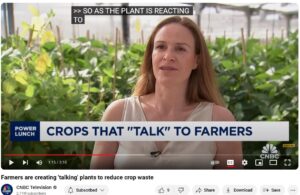
(original video report and article available at CNBC.com)
What if plants could talk to farmers and tell them when they’re distressed? That would not only help the plants but also reduce the amount of agricultural waste that threatens the planet’s health.
Much of agriculture may look green, but the industry is one of the world’s biggest carbon offenders. It accounts for at least 10% of global greenhouse gas emissions, according to 2021 data from the Environmental Protection Agency. Agricultural waste adds to the problem.
Even with the use of pesticides, up to 40% of most food crops globally are lost to disease and pests, according to data from the Food and Agriculture Organization of the United States cited in a 2023 report from the National Institute of Food and Agriculture. Now companies like SatAgro, Climate FieldView, and a California-based startup called InnerPlant are working to reduce agricultural waste.
Using genetic engineering, InnerPlant helps crops communicate with their farmers. The technology uses fluorescents that emit a signal in the leaves when a plant is in distress. That signal is detectable from devices that can be attached to satellites, drones or tractors.
“As the plant is reacting to the stresses in your environment, like fungal pressure insects or nitrogen deficiency, it will start to signal and then we can help farmers understand what areas of the field need something and what areas are fine and don’t need additional chemicals,” said Shely Aronov, CEO of InnerPlant.
From that signal, farmers know what to treat, meaning they don’t waste money on chemicals, which are over-applied by up to 30%, Aronov said.
“We want to eliminate all the unnecessary applications of chemicals into our food system, into our soils, and also the additional cost that comes to farmers that they don’t get any benefit from,” added Aronov.
This technology is highly scalable and could be licensed to major seed companies. InnerPlant would earn royalty revenue, which makes it enticing to investors.
“If you can get this technology into every single corn seed or soybean seed across North America and South America, that is many hundred millions of acres, and you can think about a few dollars per acre from a revenue perspective. That all of a sudden ends up in a lot of revenue for this business,” said Tom Biegala, founding partner of Bison Ventures, an InnerPlant investor.
In addition to Bison Ventures, InnerPlant is backed by John Deere, MS&AD Ventures, UpWest VC and Bee Partners. It has $22.3 million in total funding.
InnerPlant is now working closely with small farmers and some of the nation’s largest agriculture producers. Some have paid to get early access to the technology, which will start with soybeans and then expand to other crops.